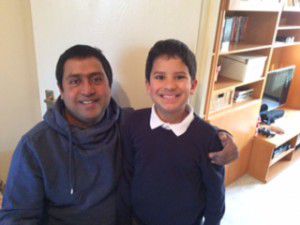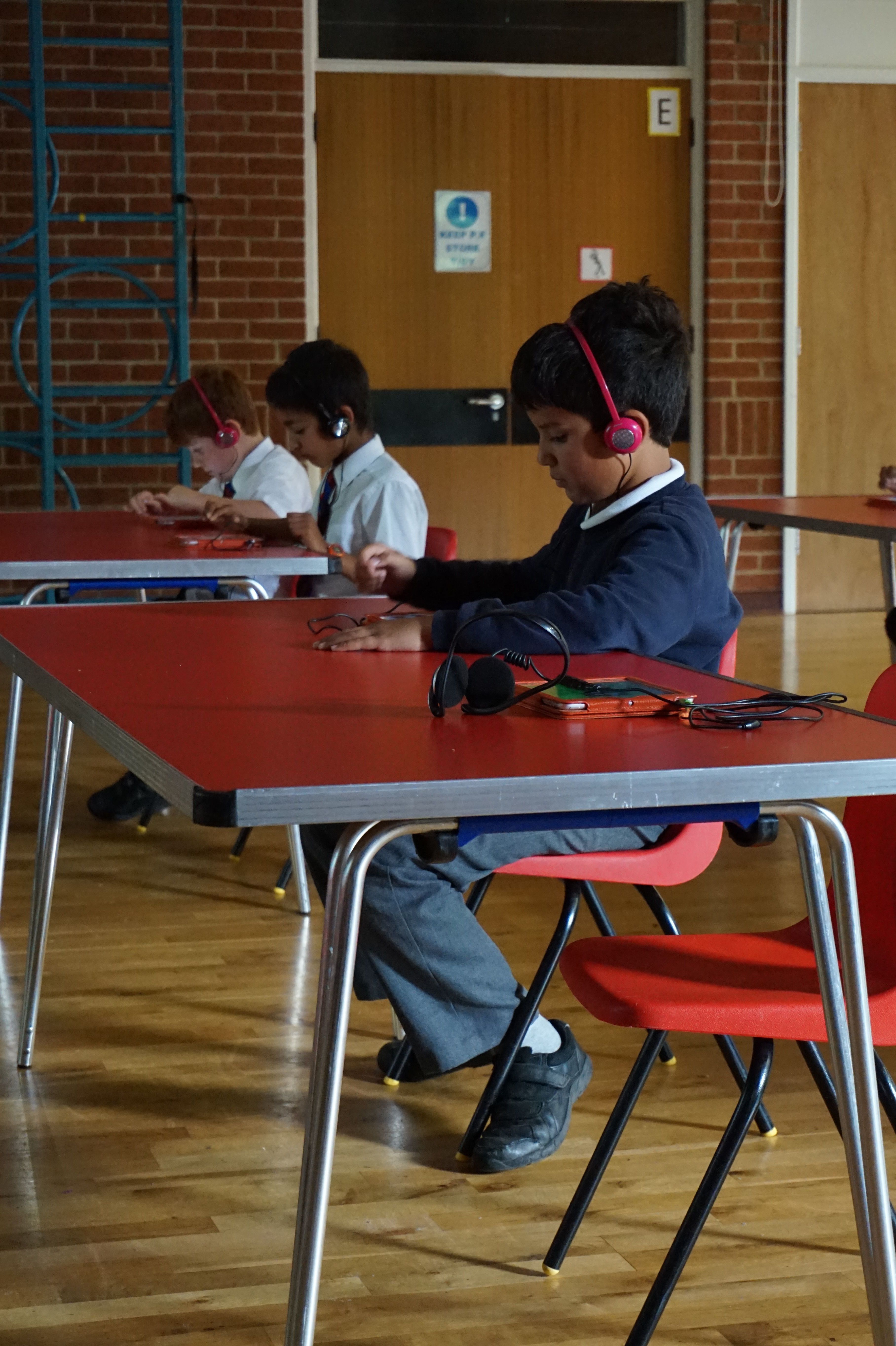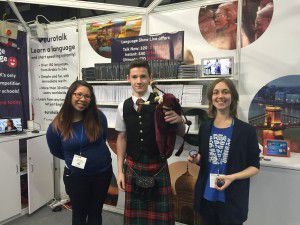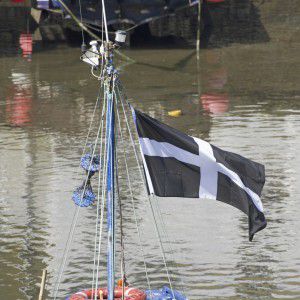We love Glasgow!
Last weekend, EuroTalk was in Glasgow for the Language Show Live. And – don’t tell our boss! – we almost didn’t come back.
That’s because Glasgow is the best place in the world. Full stop. End of discussion. We loved it, and here are our reasons why:
1) Everyone is enormously friendly
I know that sounds like a bit of a generalisation, but seriously: every single person we met, from the train manager to the taxi drivers to the hotel staff to the Hibs football fans in the pub, to all the people we talked to at the Show – all of them were so friendly. Being used to the anonymity of London, where you’re lucky to make eye contact with people on the street, this was a very welcome change. One of our taxi drivers took us on an impromptu tour of the city centre, pointing out interesting (if sometimes dubious) architectural facts, and even the show’s bagpiper was happy to visit our stand for a photo:
2) The food is amazing
We didn’t even need to do any research on where to eat – just flopped out of the show each day and into the nearest pub, restaurant or cafe. The West End is famed for its great places to eat out, but as we were staying central, we took a chance in the centre of town and got lucky every time, as Glasgow is riddled with wonderful nooks and quirky bars to grab a bite or a drink in. I think our collective favourite was The Butterfly and The Pig, a bustling, cosy basement pub which offered warming food and comfy sofas at the end of a very long day. With the obligatory pint of Belhaven Best, of course.
3) The Central Station
It’s been a longstanding dream of mine to one day stay in the hotel in Glasgow’s Central Station. I’ve no idea what the hotel is like, but from the outside you imagine waking up in the mornings and looking out over the glass and dark wood interior of the station, with trains departing on early morning journeys. We weren’t staying there, of course, but we did arrive and leave from the stunning Central Station and what better introduction to the city could you hope for?
4) Culture
To be fair, as we were mostly inside the SECC, we didn’t visit any cultural icons, but then that’s all the more reason to go back again. Just walking down the Clyde between the Transport Museum and the BBC, with the Hydro to your side, and sneaking a peak at the School of Art and the Rennie Mackintosh street lamps spilling onto the street, then savouring a cup of tea in the Willow Tea Rooms and walking past the Tenement House, gives you a brief introduction to the depth of culture going on in this city. And that’s without mentioning the Kelvingrove Art Gallery, the Burrell Collection, The Hunterian, The Lighthouse…
5) Hope
Maybe it sounds a bit corny, but partly because we were there for the Language Show and everyone who attends the language show tends to be hugely enthusiastic about languages, we really did get a massively positive boost from being in Glasgow. Added to that, the show was also a forum for discussion of Scotland’s new Curriculum for Excellence and Primary 1 + 2 policy on languages, so there was a lot of enthusiasm about the exciting new path Scotland’s eduction system is taking. This country seems to have it all sussed out!
So thanks to Glasgow for making three slightly exhausted ladies feel very much at home- we can’t wait to see you again soon!
Nat
Junior Language Challenge: fun for the whole family!
Isobel Eason from Hartlepool qualified for the Junior Language Challenge final two years in a row, and came third last year, with her proud family cheering her on. Here her mum Vickie shares their experience of the competition…
If you’re a parent or teacher of children aged 10 and under in the UK, visit juniorlanguagechallenge.com to find out more about our annual competition, which is now open! Entry costs just £5, which is all donated to our fantastic charity, onebillion.
The Junior Language Challenge has been an amazing experience from start to finish. My daughter Isobel thoroughly embraced the challenges and new languages that it offered.
Isobel qualified for the final in each of the last two years. The first year was a daunting experience but being one of the youngest to qualify that year did not put her off. As a family we all learnt along with her, even creating songs and rhymes to help her learn some of the trickier phrases. We sometimes still all sing them on the way to school on a morning whenever something reminds us of the languages she studied. She did really well in the final that year, finishing just outside the top 15.
The following year was a different story for Isobel. We noticed a real difference in the way she approached learning the new languages and every spare minute she had she spent practising. Mandarin has to have been one of her favorites. The final was very different as we all knew what to expect. I was dreading the leaderboard the most, it’s horrible to see the children moving up and down and I don’t know how Isobel managed to block it out. We were overjoyed when she made the final round, though we spent the entire final on the edge of our seats! I was so nervous for her but she was amazing, and her face when she had finished and looked at the scoreboard was an absolute joy. She had finished third! All of her hard work and determination had paid off.
I was amazed throughout at how quickly she picked up the different languages. The JLC and their fantastic team of people has provided Isobel with an invaluable experience, learning six languages over the last two years whilst also supporting the very worthy onebillion charity. It’s been an adventure that none of us will ever forget and one that we can’t recommend highly enough.

Kernow Bys Vyken!
It’s not often you hear the Cornish language spoken in the streets of London. To be honest, it’s not often you hear it in the streets of Cornwall, although I promise it does happen, if you know where to look.
But this weekend was an exception, because Saturday was St Piran’s Day, the national day of Cornwall, and London was celebrating in style with its annual Shoreditch celebration, Kernow In The City.
So what’s it all about?
Drinking heavily!
No, I’m joking, of course – in fact, I find St Piran’s Day is one of the more sober Cornish celebrations, as it’s really more about celebrating the culture of Cornwall. Back home, different towns have different traditions, but usually there’ll be music and singing, a parade of some sort, perhaps some dancing and dressing up, occasionally a pasty competition. In Westminster, the Cornish MPs hold a cultural reception which aims to teach more about Cornwall’s identity and culture.
The Shoreditch evening event, which I’ve been going to for a good 4 or 5 years, is also primarily a cultural celebration, with different Cornish talent every year and a heavy focus on music (this year featured the amazing Flats and Sharps as the grand finale, last year saw The Oggymen taking centre stage), as well as a variety of comedians (The Kernow King has been guest of honour in the past, and still usually makes a remote appearance via video).
But get a lot of pining ex-pat Cornish together and a few kegs of Betty Stogs beer and it will inevitably turn into a somewhat tipsy affair, with plenty of drunken dancing by the end of the evening. And that’s part of the reason I love Kernow In The City: every year I take along a few non-Cornish people, who tentatively agree to attend in the full expectation of being hounded out of the venue for being English, and although some of the in-jokes about miniature Cornish villages do go over their heads, and the bilingual compering leaves plenty to be understood, by the end of the evening they’re usually bellowing out the words to Trelawney (our national anthem) with great passion, and dancing with total strangers.
Nothing could do more to dispel the myth of the Cornish cold shoulder than the St Piran’s Day event: take a small interest in Cornish culture and you really will be welcomed with open arms. Learn a couple of words of Cornish and you’ll be the talk of the town. And if you’re going to learn anything, learn these three words: Kernow Bys Vyken (Cornwall For Ever), a toast to make you Cornish friends for life.
Proper job!
Nat
Mum’s the word! How different languages say ‘mother’
Today is the day we celebrate ‘Mother’s day’ or ‘Mothering Sunday’ here in the UK.
Mum is one of those words we start to use from a young age; perhaps you used ‘mumma’, ‘mother’, ‘mam’ or ‘mummy’ instead; there are many ways to say it! Some languages offer a similar word to English, like ‘la madre’ in Spanish and in Italian. Typically the word for mother does start with an ‘m’ or a ‘b’ as these are soft and easy sounds when you’re a child, creating the ‘m’ noise is one of the easiest ones to make. In Afrikaans the word for mother is just ‘ma’ and in Swahili it’s ‘mama’.
However, that’s not always the case: in Fijian the word for mother is ‘tina’, in Kurdish (Sorani) it is ‘daik’ and in Swiss it is ‘d’Mueter’. In other languages the m or b is replaced with a ‘h’ sound – in Japanese mother is ‘haha’ and in Somalia it is ‘hooyo’. Would you expect ‘Whaea’ to translate into the English word ‘Mother’? This is perhaps one of the more unusual ways of saying mother in another language (Maori). Interestingly in Georgian, it is completely different to English, with ‘mama’ meaning father and ‘deda’ for mother.
When it comes to the Romance and Germanic languages, there are a lot of similarities between both ‘mother’ and ‘father’ translations. Father tends to start with a ‘p’ or a ‘b’ sound, which are also easy noises for children to make.
Here are some other words for ‘mother’ in different languages:
Slovak – matka
Scots Gaelic – a’ mhàthair
Hungarian – anya
Albanian – nënë
Tagalog – nanay
How do you say ‘mother’ in the language you’re learning?
Happy Mother’s Day to all the mums, tinas, madres and nanays – we hope you have a lovely day!
Alex
Counting the days: Reuben can’t wait for his 4th Junior Language Challenge
In today’s blog post, father and son Joseph and Reuben share with us their JLC story and how learning made fun got them counting the days until this year’s competition.
If you’re a parent or teacher of children aged 10 and under in the UK, visit juniorlanguagechallenge.com to find out more about our annual competition, which opens on Friday 11th March.
Reuben was just 6 and in Year 2 when a teacher with a passion for languages opened the JLC to this year group for the 1st time. Reuben got stuck in to learning Spanish, then Greek, breezed past most of the school including the Y6s and in to the East-Midlands’ semi-final. He came 4th. This was an inspiration to the other children that left them waiting for the next JLC. His success justified an early introduction of Abbey Road children to the exciting challenge of learning a new language. The sheer passion and excitement with which he approached the languages, the colourful child-friendly software and the brain-teasing range of games that increased in difficulty as his competence increased and introduced the language as it might be used in every-day life, kept him glued to learning, so much so that he was at it during every waking moment. For once, we parents did not have to battle with him to get off his game console or the iPad! Most importantly he remains as enthusiastic and motivated several challenges on.
 Reuben waited eagerly for his next shot at the JLC in Year 3. While the 1st round was a doddle for him, he crashed ignominiously out of the semi-final, learning an important life lesson, that there is no substitute for hard work. Rather than letting this get him down, he worked very hard and consistently in Year 4, at gaining a working knowledge of Portuguese, then Mandarin and qualified for the final in London. He was very excited and enthused by his success and immersed himself in learning Arabic for this. The fierce competition did not deter him but rather spurred him on and he came 13th after a hard fought set of heats.
Reuben waited eagerly for his next shot at the JLC in Year 3. While the 1st round was a doddle for him, he crashed ignominiously out of the semi-final, learning an important life lesson, that there is no substitute for hard work. Rather than letting this get him down, he worked very hard and consistently in Year 4, at gaining a working knowledge of Portuguese, then Mandarin and qualified for the final in London. He was very excited and enthused by his success and immersed himself in learning Arabic for this. The fierce competition did not deter him but rather spurred him on and he came 13th after a hard fought set of heats.
Having enjoyed himself so much and coming within a hair-breadth of winning, he continues his JLC journey. He cannot wait for this year’s challenge to begin. He is counting the days!
Joseph Chandy
___
I started the Junior Language Challenge in Year 2 at the age of 6 and have taken the Challenge every year since then. It is an amazing experience that I look forward to.
I love languages and was extremely interested in participating. I loved the way the games were laid out. This makes them really easy to understand and play and most importantly, it makes the whole experience really fun. No matter how hard the language is or may seem, EuroTalk makes it easy to learn and understand.
JLC combines two extremely important things in life, having lots of fun and language learning. It’s definitely not boring; it’s one of the best and most exciting experiences you can have. I love the competition it creates; the urge to win in all competitors is great. One of the things I love about the JLC is how you can share the massive excitement and competitiveness with other people who are also in the challenge. I strained to be at the top of the scoreboard, competing with my friends Adam and Farah Akbar and many others.
 Getting to the semi-final and final is a special feeling I will never forget. The feeling that you’re among the best of the massive amount of participants is simply amazing. The best thing is, the entrance fee is only £5 and it goes to an absolutely wonderful cause, a non-profit organisation called onebillion, whose sole aim and cause is to give the children in Malawi a better education and a much brighter future.
Getting to the semi-final and final is a special feeling I will never forget. The feeling that you’re among the best of the massive amount of participants is simply amazing. The best thing is, the entrance fee is only £5 and it goes to an absolutely wonderful cause, a non-profit organisation called onebillion, whose sole aim and cause is to give the children in Malawi a better education and a much brighter future.
I hope that more people can join the Junior Language Challenge and share this brilliant experience. I love the Junior Language Challenge and I will never forget it. JLC 2016 is a few mere days away!
Reuben Chandy




